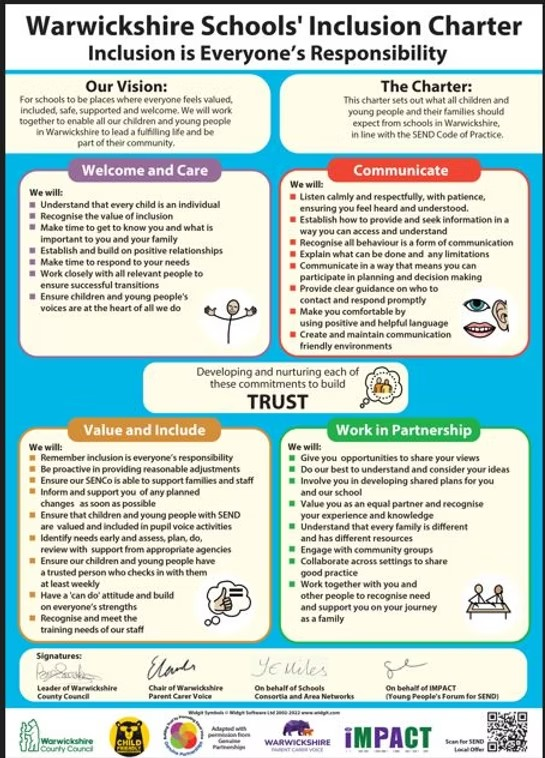“We rise to great heights by a winding staircase of small steps.”
-Francis Bacon
-Francis Bacon
Our SEND ethos is in line with the SEND Code of Practice which states:
All children and young people are entitled to an appropriate education, one that is appropriate to their needs, promotes high standards and the fulfilment of potential. This should enable them to:
At Rugby Free Primary School, our intention is to ensure that all children receive a high-quality education with a broad and balanced curriculum, which will help them to achieve success and reach their individual potential. We aim to equip pupils with skills necessary for success in life beyond their primary education, regardless of need or disability. We believe that this will help them to become curious and resilient learners, kind and respectful citizens with the skills to collaborate and continue to endeavour. Throughout our SEND provision, the children are at the centre of our work. We intend to build independence in our children with additional needs, through providing an accessible and engaging learning environment. We believe that partnership with parents and carers is vital, as well as working alongside external agencies and professionals to continuously improve our provision for children with additional needs.
The SEND Code of Practice states:
“A child or young person has Special Educational Needs (SEN) where their learning difficulty or disability calls for special educational provision, namely provision different from or additional to that normally available to pupils of the same age.”
“A child has a learning difficulty or disability if he or she:
Additional needs can be grouped under four broad areas of need:
Linked to this, the SEND Code of Practice advises:
“These four broad areas give an overview of the range of needs that should be planned for. The purpose of identification is to work out what action the school needs to take, not to fit a pupil into a category. In practice, individual children or young people often have needs that cut across all these areas and their needs may change over time..”
At Rugby Free Primary School, our staff follow the “Assess, Plan, Do, Review” cycle in order to effectively identify and support children with additional needs:
Wherever possible and appropriate, this process is carried out in conjunction with the child and their parents/carers.
A child receiving sustained special educational provision will be placed on the school SEND register. An Individual Support Plan (ISP) will be created alongside the child and their family, consisting of specific targets and an outline of additional provision. This plan will be reviewed and targets updated at 3 points through the year, following the Assess, Plan, Do, Review approach.
Special Educational Provision at RFPS is matched to meet the children’s individual needs as far as possible. Our last Ofsted report (2018) stated: “Teachers identify pupils who would benefit from extra help effectively. The careful organization of classes enables pupils to receive daily, tailored support to address any gaps in learning they may have or to meet their social and emotional needs. Staff receive training to enable them to deliver a range of highly effective interventions.” Additional provision may involve a range of support including:
If a child requires further or more targeted support, this is provided through a range of external support agencies. More information about the support offered by the Local Authority can be found at https://www.warwickshire.gov.uk/sendlocaloffer
The Special Educational Needs and Disabilities Co-ordinator at RFPS is Mrs Kat Swain, the Inclusion Lead is Miss Ellie Finch. Please contact them through the school office for further information about SEND support at RFPS. Please also refer to the school SEND information report and the SEND policy.
Warwickshire Local Offer: https://www.warwickshire.gov.uk/sendlocaloffer
Warwickshire SENDIASS (Special Educational Needs Information Advice and Support Services): Support for parents of children with additional needs: https://www.kids.org.uk/my-sendiass




This area of need includes specific learning difficulties (SpLD) such as dyslexia, dyscalculia and dyspraxia, as well as moderate (MLD), severe (SLD) and profound and multiple (PMLD) learning difficulties.
